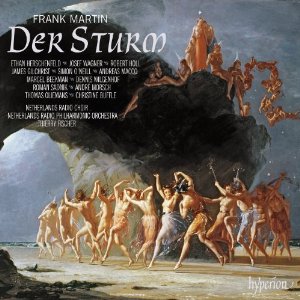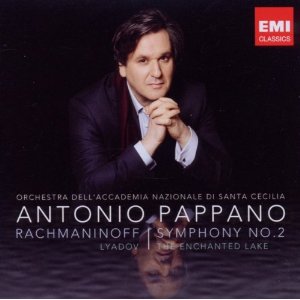Classical CDs Weekly: Boyle, Martin, Rachmaninov | reviews, news & interviews
Classical CDs Weekly: Boyle, Martin, Rachmaninov
Classical CDs Weekly: Boyle, Martin, Rachmaninov
Featuring a rare Shakespearian opera and a Scottish composer celebrating his 60th
This Saturday we’ve a new recording of a famous Russian symphony played by an Italian orchestra under their London-based principal conductor. There’s a rare Shakespearean opera written in the 1950s by a Swiss master using a German text. And a Scottish composer celebrates his 60th birthday with an invigorating collection of piano and chamber works.
 Rory Boyle: Music for Solo Piano, Phaethon’s Dancing Lesson
Rory Boyle: Music for Solo Piano, Phaethon’s Dancing Lesson
James Willshire (piano), Bartholdy Trio (Delphian)
As a 12-year-old I sang in the first performance of Scottish composer Rory Boyle’s children’s opera Alfege. Dressed in grey tights and wearing a tabard made from what looked like bits of old carpet, my role involved rushing centre stage in an early scene and shouting out the word “Pillage!” It was a shock to read that this anthology of piano and chamber works is released to celebrate the composer’s 60th birthday – I can still recall a wiry, impossibly youthful figure. The works chosen have a broad stylistic range. You start listening to Arrivals and Departures, four beguiling short pieces commemorating the births or deaths of family friends, and you’re instantly seduced. Then Reeling bursts into life, the thrilling, dissonant toccata figurations brilliantly sustained by the work’s dedicatee, James Willshire.
Boyle’s compact, pungent Sonata makes for compelling listening, especially the central Recitatives and Dreams with its bell-like sonorities. There’s an ingenious Bach tribute, three enigmatic, thorny Studies for the one in the middle, and Boyle’s piano trio, Phaethon’s Dancing Lesson. Here, the myth of Phaethon driving the sun chariot allows Boyle to compose a compact sequence of five bleak, pithy dances. It’s not a comfortable listening experience, but it’s so, so exciting. Turn to the tiny, charming Tatty’s Dance, a two-minute birthday gift for the composer’s wife, and you’re converted. It’s unmistakably the work of the same composer though – you sense it in the shifting metres and darkly coloured chords.
 Frank Martin: Der Sturm (The Tempest)
Frank Martin: Der Sturm (The Tempest)
Soloists, Netherlands Radio Choir and Philharmonic Orchestra/Thierry Fischer (Hyperion)
Swiss composer Frank Martin’s 1954 opera receives its belated first recording in a live performance directed by Thierry Fischer. Martin used a famous German translation of Shakespeare’s text, effectively retaining the essence of the original. Musically, Der Sturm is a joy – Martin’s distinctive, highly chromatic Neo-Classicism resulting in music of rare beauty and wit. You hear this in the Prelude’s gently swirling lines, and in the brief, memorable chord progressions which knit the score together. Martin saw Ariel as the voice of Nature, his ethereal outpourings sung by an offstage chorus with tinkling harpsichord accompaniment. Naturally, Caliban’s twisted vocal lines are, in the composer’s words, "edgy", and murkier harmonically. There are hints of Weill and Eisler in Gonzalo’s urbane, jazzy music. The disparate elements fuse seamlessly, and as the various threads are tied up and your eyes moisten during Prospero’s weary final monologue, you can’t help feeling immensely saddened that this work has never received a professional staging in Britain.
Thierry Fischer’s immaculate concert performance was taped in the Concertgebouw in 2008. Martin’s lucid textures have a cool radiance and the casting is strong, led by bass Robert Holl’s charismatic Prospero and Christine Buffle as Miranda. This piece demands to be heard – it’s unshowy, tautly constructed and often heartbreaking. Excellent notes and a full libretto are provided. What are you waiting for?
 Rachmaninov: Symphony No 2, Lyadov, The Enchanted Lake
Rachmaninov: Symphony No 2, Lyadov, The Enchanted Lake
Orchestra dell’Accademia Nazionale di Santa Cecilia, Roma/Antonio Pappano (EMI)
Anatoly Lyadov is remembered, if at all, as a minor footnote in musical history. Near the end of his life he was Diaghilev’s first choice to compose a ballet based on The Firebird, a job which eventually fell to a young composer called Stravinsky. Lyadov excelled as a creator of perfumed miniatures, and The Enchanted Lake fits this template perfectly. Rarely performed today, it provides an apt companion piece to Antonio Pappano’s live account of Rachmaninov’s Second Symphony. Sadly, it’s easy to understand the neglect; Lyadov’s little tone poem is perhaps too brief and elusive for popular taste, a tiny gesture compared to the symphony’s heavy, emotive posturing.
I like the sound of Pappano’s Rome orchestra; there’s a satisfying richness to the lower string sonority which gives the glowering introduction a brooding intensity. The tiny touches of rubato, of ebb and flow, are unobtrusively applied; the first movement’s lyrical second theme emerges haltingly, hesitantly. I’d never realised before how closely Rachmaninov modelled the movement on Tchaikovsky’s Pathétique, with an apocalyptic brass-led climax leading to a passage where it feels as if we’re picking ourselves up off the floor. The scherzo’s fugal processional glitters, and there’s a nicely audible stopped horn pedal rattling away near the close. Pappano’s Adagio flows sweetly, and his Allegro vivace is uplifting but never over-sentimental. It’s a wonderful work, and a good performance can make me rheumy-eyed in a way that Mahler and Tchaikovsky never can. This is a really good performance. I blubbed.
Share this article
The future of Arts Journalism
You can stop theartsdesk.com closing!
We urgently need financing to survive. Our fundraising drive has thus far raised £49,000 but we need to reach £100,000 or we will be forced to close. Please contribute here: https://gofund.me/c3f6033d
And if you can forward this information to anyone who might assist, we’d be grateful.

Subscribe to theartsdesk.com
Thank you for continuing to read our work on theartsdesk.com. For unlimited access to every article in its entirety, including our archive of more than 15,000 pieces, we're asking for £5 per month or £40 per year. We feel it's a very good deal, and hope you do too.
To take a subscription now simply click here.
And if you're looking for that extra gift for a friend or family member, why not treat them to a theartsdesk.com gift subscription?
more Classical music
 BBC Proms: Suor Angelica, LSO, Pappano review - earthly passion, heavenly grief
A Sister to remember blesses Puccini's convent tragedy
BBC Proms: Suor Angelica, LSO, Pappano review - earthly passion, heavenly grief
A Sister to remember blesses Puccini's convent tragedy
 BBC Proms: A Mass of Life, BBCSO, Elder review - a subtle guide to Delius's Nietzschean masterpiece
Mark Elder held back from blasting the audience with a wall of sound
BBC Proms: A Mass of Life, BBCSO, Elder review - a subtle guide to Delius's Nietzschean masterpiece
Mark Elder held back from blasting the audience with a wall of sound
 BBC Proms: Le Concert Spirituel, Niquet review - super-sized polyphonic rarities
Monumental works don't quite make for monumental sounds in the Royal Albert Hall
BBC Proms: Le Concert Spirituel, Niquet review - super-sized polyphonic rarities
Monumental works don't quite make for monumental sounds in the Royal Albert Hall
 Frang, Romaniw, Liverman, LSO, Pappano, Edinburgh International Festival 2025 review - sunlight, salt spray, Sea Symphony
Full force of the midday sea in the Usher Hall, thanks to the best captain at the helm
Frang, Romaniw, Liverman, LSO, Pappano, Edinburgh International Festival 2025 review - sunlight, salt spray, Sea Symphony
Full force of the midday sea in the Usher Hall, thanks to the best captain at the helm
 Elschenbroich, Grynyuk / Fibonacci Quartet, Edinburgh International Festival 2025 review - mahogany Brahms and explosive Janáček
String partnerships demonstrate brilliant listening as well as first rate playing
Elschenbroich, Grynyuk / Fibonacci Quartet, Edinburgh International Festival 2025 review - mahogany Brahms and explosive Janáček
String partnerships demonstrate brilliant listening as well as first rate playing
 BBC Proms: Akhmetshina, LPO, Gardner review - liquid luxuries
First-class service on an ocean-going programme
BBC Proms: Akhmetshina, LPO, Gardner review - liquid luxuries
First-class service on an ocean-going programme
 Budapest Festival Orchestra, Iván Fischer, Edinburgh International Festival 2025 review - mania and menuets
The Hungarians bring dance music to Edinburgh, but Fischer’s pastiche falls flat
Budapest Festival Orchestra, Iván Fischer, Edinburgh International Festival 2025 review - mania and menuets
The Hungarians bring dance music to Edinburgh, but Fischer’s pastiche falls flat
 Classical CDs: Hamlet, harps and haiku
Epic romantic symphonies, unaccompanied choral music and a bold string quartet's response to rising sea levels
Classical CDs: Hamlet, harps and haiku
Epic romantic symphonies, unaccompanied choral music and a bold string quartet's response to rising sea levels
 Kolesnikov, Tsoy / Liu, NCPA Orchestra, Chung, Edinburgh International Festival 2025 review - transfigured playing and heavenly desire
Three star pianists work wonders, and an orchestra dazzles, at least on the surface
Kolesnikov, Tsoy / Liu, NCPA Orchestra, Chung, Edinburgh International Festival 2025 review - transfigured playing and heavenly desire
Three star pianists work wonders, and an orchestra dazzles, at least on the surface
 BBC Proms: Láng, Cser, Budapest Festival Orchestra, Iván Fischer review - idiomatic inflections
Bartók’s heart of darkness follows Beethoven’s dancing light
BBC Proms: Láng, Cser, Budapest Festival Orchestra, Iván Fischer review - idiomatic inflections
Bartók’s heart of darkness follows Beethoven’s dancing light
 Weilerstein, NYO2, Payare / Dueñas, Malofeev, Edinburgh International Festival 2025 review - youthful energy and emotional intensity
Big-boned Prokofiev and Shostakovich, cacophonous López, plus intense violin/piano duo
Weilerstein, NYO2, Payare / Dueñas, Malofeev, Edinburgh International Festival 2025 review - youthful energy and emotional intensity
Big-boned Prokofiev and Shostakovich, cacophonous López, plus intense violin/piano duo

Add comment